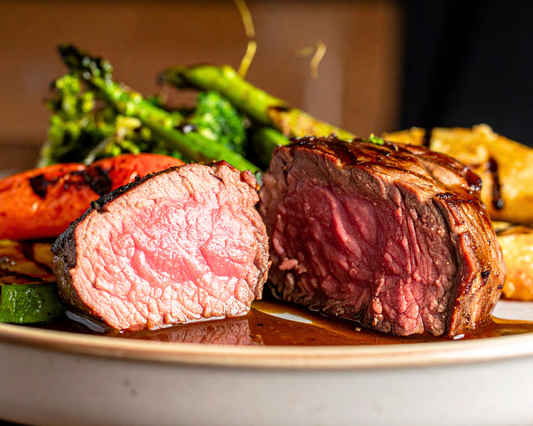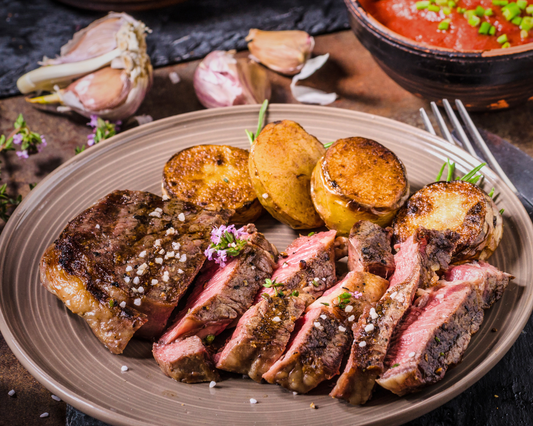When it comes to choosing the right meat for your next meal, most Canadians automatically reach for ground beef. It's familiar, affordable, and widely available. But in recent years, ground bison has gained popularity as a leaner, more sustainable alternative. Whether you're planning burgers, meatballs, tacos, or a hearty Bolognese, knowing the differences between ground bison and ground beef can help you make a more informed—and tastier—choice.
In this post, we'll explore the key differences between ground bison and ground beef in terms of nutrition, flavour, texture, versatility, and cost, helping you decide which meat deserves a place on your plate.
Nutrition: Bison Is the Leaner Protein
If you're looking for a protein-packed meal without the extra fat, ground bison is a clear winner. Bison meat is naturally leaner than beef, making it a great choice for health-conscious eaters.
Here’s a nutritional comparison (per 100 grams of cooked meat):
| Nutrient | Ground Bison | Ground Beef (85% lean) |
|---|---|---|
| Calories | ~143 | ~215 |
| Protein | ~28g | ~26g |
| Fat | ~2.4g | ~17g |
| Saturated Fat | ~1g | ~7g |
| Iron | Higher | Lower |
| Omega-3 Fatty Acids | Higher | Lower |
Bison is rich in iron, zinc, and vitamin B12, which are essential for energy production and immune support. It also contains more omega-3 fatty acids, known for their anti-inflammatory benefits.
Meanwhile, ground beef—depending on the cut and fat content—has more saturated fat. That said, beef is still a good source of essential nutrients and remains a staple protein in many Canadian households.
Winner: Ground Bison for lean nutrition and heart health.
Flavour: Beefy vs. Earthy
Flavour can be subjective, but there are clear distinctions between these two meats.
Ground beef has a rich, buttery flavour that many people associate with comfort food. Its higher fat content delivers that juicy, satisfying mouthfeel, especially when grilled or pan-fried.
On the other hand, ground bison has a slightly sweet, earthy flavour. It's often described as "clean-tasting" or "gamey" (but only mildly so). Because of its leanness, bison doesn’t have the same fatty richness as ground beef, which can be a plus or minus depending on your palate.
Some people say that ground bison tastes “closer to nature,” making it a great match for bold seasonings like garlic, smoked paprika, chipotle, and rosemary.
Winner: Tie – It depends on your flavour preferences. Choose beef for richness, bison for clean, wild flavour.
Texture: Juiciness Matters
In terms of texture, ground beef tends to be softer and juicier thanks to its fat content. When cooked properly, it holds moisture well and is perfect for burgers and patties that don’t dry out.
Ground bison, due to its lower fat, can dry out quickly if overcooked. It has a firmer, finer texture and doesn’t shrink as much when cooked. To retain moisture, it’s best cooked to medium-rare or medium and not beyond. Mixing in a splash of oil or finely chopped vegetables can help boost juiciness in bison-based recipes.
Winner: Ground Beef – for moisture and tenderness. Bison requires more care but is still rewarding.
Versatility: Both Are Kitchen All-Stars
When it comes to versatility, both ground bison and ground beef shine in the kitchen.
From classic burgers and tacos to shepherd's pie and pasta sauces, ground beef is incredibly adaptable and is a go-to protein for many quick weeknight meals.
Ground bison can be used in all the same recipes, often with little to no adjustment. However, you’ll want to watch cooking times to avoid overcooking. Its bold, earthy flavour pairs beautifully with herbs, spices, and marinades, making it a hit in more elevated or gourmet-style recipes.
Whether you’re grilling, sautéing, or baking, both meats perform well—but bison requires slightly more finesse.
Winner: Tie – Both are flexible, but beef is more forgiving.
Cost: Bison Is a Premium Choice
The biggest difference shoppers notice is price. Ground bison is more expensive than ground beef—often double the cost or more depending on the supplier and whether it's organic or grass-fed.
Why the higher price for bison?
-
Bison are raised on smaller farms, often grass-fed and pasture-raised.
-
They require more space and longer growing times compared to cattle.
-
Supply is limited, which drives up the cost.
However, many Canadians are willing to pay more for the health benefits, sustainability, and unique flavour that bison offers.
Winner: Ground Beef – if budget is a key consideration.
Sustainability and Ethics
Sustainability and ethical farming practices are increasingly important to Canadian consumers.
Bison farming typically involves free-range grazing and lower environmental impact. Because bison are native to North America, their grazing habits naturally restore grasslands and reduce soil erosion.
Beef tends to have a larger environmental footprint in terms of land, water, and methane emissions. However, grass-fed and organic beef options are improving this balance.
If environmental impact is a concern, bison may be the more sustainable choice.
Here’s a quick recap of the ground bison vs. ground beef debate:
| Category | Winner |
|---|---|
| Nutrition | Ground Bison |
| Flavour | Tie |
| Texture | Ground Beef |
| Versatility | Tie |
| Cost | Ground Beef |
| Sustainability | Ground Bison |
Ground bison is ideal if you're looking for a lean, nutrient-dense, ethically raised protein with a distinctive taste. It's great for those willing to spend a little more for health and sustainability.
Ground beef, on the other hand, remains a versatile, affordable, and flavourful option for everyday meals. It’s the ultimate comfort food and is perfect for recipes that require a bit more fat and juiciness.
Pro Tip:
Whichever meat you choose, make sure to cook it properly to get the best results. For bison, don’t overcook it. For beef, consider draining excess fat for a leaner dish.
Order our Ground Beef Collection















